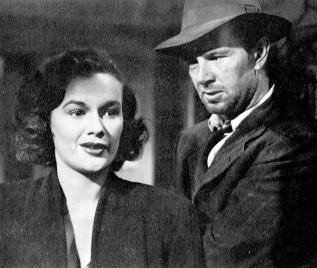
As in the director's great Maltese Falcon, all the events in Jungle revolve around a legendary "score." In the former, the object of everyone's desire is a jewel-encrusted bird. Here, it's a stash of rare jewels, purportedly worth more than a million dollars. Among those involved in the caper to steal the jewels: a recently-paroled German emigre named Reidenschneider (whose name was borrowed by the Coen Brothers in Man Who Wasn't There), a hired gun played by Sterling Hayden, bankrupted captain of industry Alonzo Emmerich, club owner Cobby and private detective Bob Brannum.
How these characters come to double cross one another in pursuit of the gems is hardly the point. I could write an involved paragraph laying out for you the specifics of the caper - how the Doc devises a plan that requires the participation of a safe-cracker, a driver and a "hooligan" and so forth - but even Huston breezes past this material. He rightly senses that a heist will entertain audiences for about 10 minutes, but that a dynamic internal conflict will keep people's attention for a good 2 hours.
I was reminded while watching this film of, well, a ton of movies, because Huston helped invent the entire noir genre, and in films like Falcon and Asphalt Jungle, he honed the archetypes that dominate crime films, and crime fiction in some ways, to this very day. But what I was going to say was that I'm reminded of Sexy Beast a bit. That's a film that opens with the elaborate plans for a daring heist and then abandons the caper storyline until the very end to focus on the bizarre psychosexual downfall of gangster Don Logan (played by Ben Kingsley in one of his all-time great performances).
Similarly, Huston deals with the caper itself only in one delightfully intense sequence, when the explosion of a safe sets off all the burglar alarms on an entire city block. As police cars and fire trucks dart about, looking in on each of the buildings, the burglars swifty and nervously complete their work.
But the focus of the film remains on the individuals completing the heist. Hayden's Dix Handley and Sam Jaffe's Doc Reidenschneider become fast friends. A word about Sam Jaffe: he portrayed hideous, embarrassing stereotype Gunga Din in the film of that name, and here portrays a old German man with some degree of success. The guy obviously was a very capable actor, except when he was limited by, you know, unthinkable racism.
Oh, and Emmerich's loyal mistress is portrayed by Marilyn Monroe in one of her first screen roles. It's odd to see her as a supporting player. Within the next few years, she'd make Let's Make It Legal, Gentlemen Prefer Blondes and finally The Seven Year Itch five years later in '55 that would cement her as the era's defining sex symbol. Here, she has a few brief scenes in which she performs ably, but there's only a whiff of the legend she'd become.
Huston always had a gift for creating memorable characters occupying the fringes of society. Recall his father Walter's timeless portrayal of a prospector in Treasure of Sierra Madre, or, hell, the entire cast of Key Largo. Asphalt Jungle introduces us to near a dozen colorful occupants of the grimy underbelly of the City, all of whom have one fatal weakness that brings about his or her undoing. Some of their undoings are violent, some merely tragic, but one sequence strikes me whenever I see it as one of the most subtle and heartbreaking in the history of noir.
Reidenschneider has hired a taxi to drive him out of town, to Cleveland, where he can hole up for a while and perhaps find a fence for the jewels. They stop in a small town diner to get a bite to eat and fill the car up with gas for the long drive. Reidenschneider sees a beautiful young girl dancing at the jukebox, and pauses a moment before leaving to flirt with her and leave her with extra nickels. We can see through the window that the police are outside waiting to arrest him. He's an old man; he'll likely die in prison. But he doesn't know (or possibly even care). He's lost for that indulgent moment, watching a beautiful girl dance for him.
It's a perfect moment, hitting all the right notes, but not overplaying the emotion or turning it into melodrama. There just isn't heartfelt filmmaking like this done any more, at least not in American film. It's a nearly lost form.

No comments:
Post a Comment